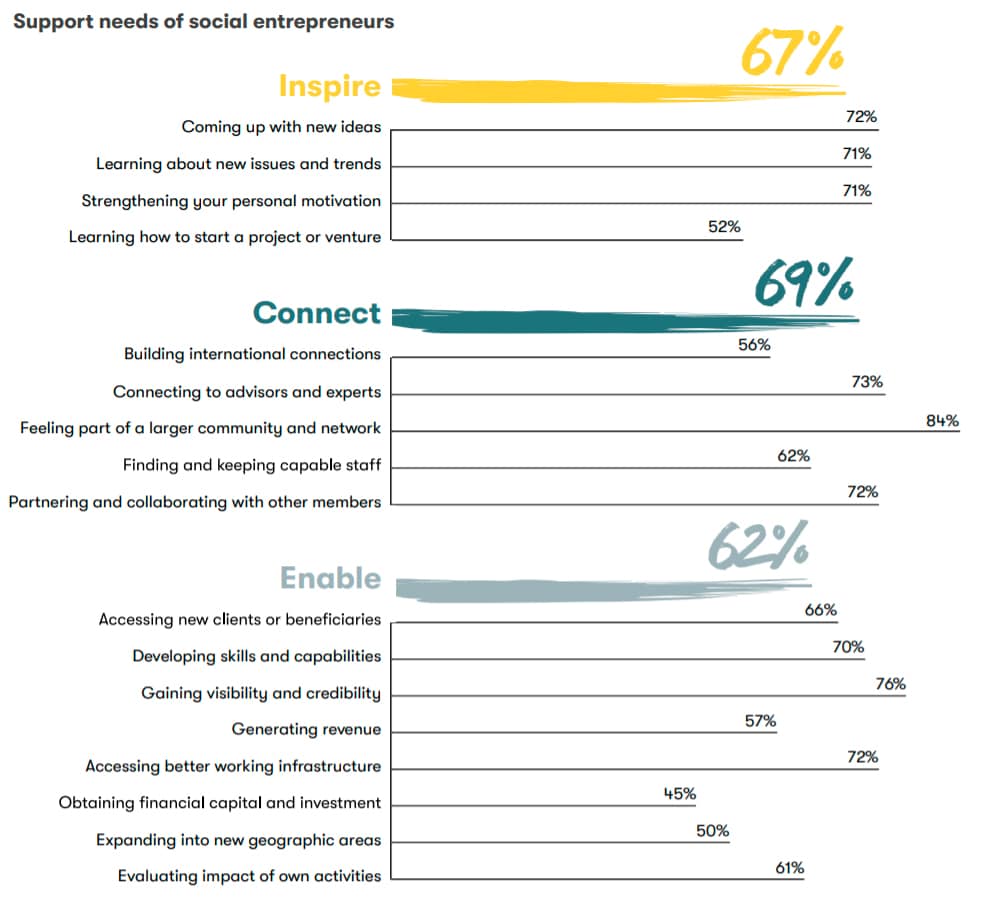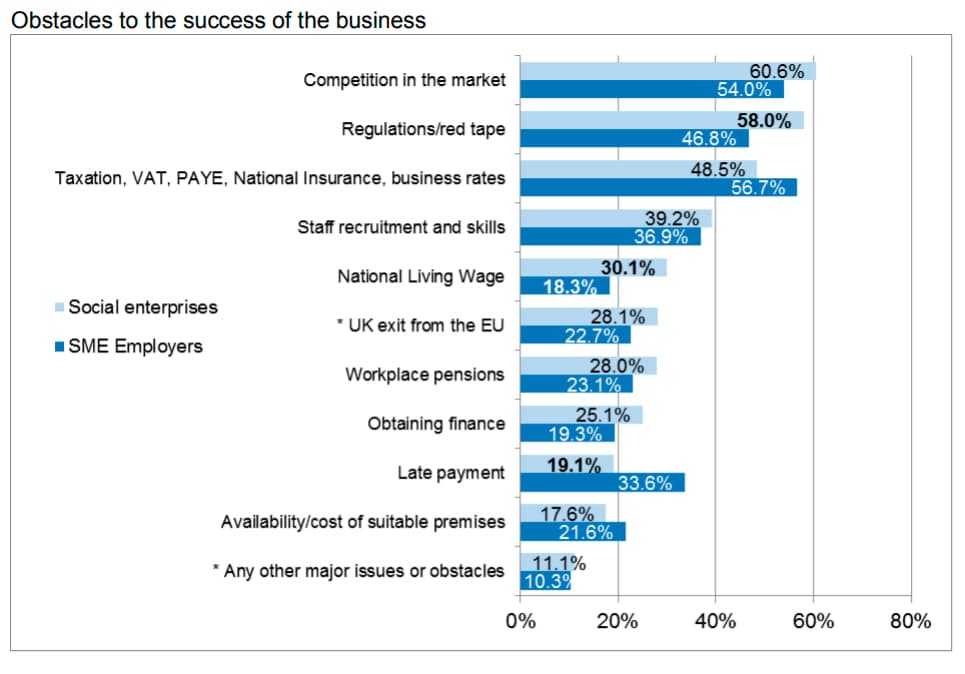Discover how social entrepreneurship works and why it is important:
Social entrepreneurs are visionary individuals with creative solutions for solving some of the world’s most perplexing social problems.
These people have the ability to identify the problem, develop a way to change the system, and disseminate the ideas so that entire societies work together to raise themselves above crisis.
Social entrepreneurs are ambitious, driven, resourceful, and results-oriented.
Social entrepreneurship is the art of creating a socially responsible business that aims to generate profit, while solving social and environmental problems.
Social entrepreneurs start and run social enterprises – commercial businesses that often come with a “triple bottom line” mandate.
The triple bottom line refers to people, profits, and the planet.
TBL implies that businesses can and ought to be run in a financially, socially, and environmentally responsible way.

(Source: Impact Hub)
According to CorpWatch, “Of the 100 largest economies in the world, 51 are businesses; the other 49 are countries. This is why triple bottom line concepts are so important – it’s not just about commerce, it’s about civilization.”
What is the difference between a social enterprise and a nonprofit?
Social enterprises are often confused with nonprofit organisations and non-governmental organisations (NGOs).
The main difference between a nonprofit and social enterprise is the revenue model. Although some charities and non-profits could also be social enterprises.
Nonprofits rely primarily on charitable contributions, public funding and foundation grants to support their programmes and cover their administrative overhead.
If, due to a bad economy; donations, grants, and public sector subsidies dried up, the non-profit would have to shut down.
Very few nonprofits have created robust earned income streams, though there is an increasing trend to do so.
A social enterprise is designed to operate like a for-profit business.

(Source: GOV.UK)
In terms of a business model, social enterprises are the most comparable to Harvard professor Michael E. Porter’s concept of Creating Shared Value (CSV).
Social enterprises rely primarily on their earned income stream, and like any other company, if needed, it takes loans, invites capital investments, forms partnerships etc. to expand its business activities.
A nonprofit’s sole aim is to create social value whereas the aim of a social enterprise is two or three-fold: financial, social, and environmental sustainability.
15 organisations, networks, and resources for social entrepreneurs
Several organisations are heralding the cause of social entrepreneurship, providing social enterprise grants and loans, or supporting social innovators through business incubation services, professional networking, information and advice.
Some of these social enterprise organisations include:
- Ashoka works with social entrepreneurs to spur projects that will profoundly transform society. They provide microfinance loans and support to the citizen sector, as well as promote collaboration between groups and networks of social entrepreneurs.
- ClearlySo is an online marketplace for social business, enterprise, and investment. Through their website, social businesses and enterprises can connect with peers, potential investors, as well as community members and governmental organisations.
- Echoing Green invests in and supports outstanding emerging social entrepreneurs to launch new organisations that deliver bold, high-impact solutions. Echoing Green offers 12-15 Fellowships each year to new social entrepreneurs, providing up to $90K in seed funding distributed via 4 equal grants over a two-year period.
- FINCA is a microfinance institution that provides small loans and financial services to the world’s lowest-income entrepreneurs through a village banking model. Neighbors within a community come together to form a financial support group known as a “village bank”. When people within the group borrow capital for their microenterprises, because they have little to offer for collateral, the group guarantees those loans. The group dynamic provides the support and the motivation for the person to pay back the loan. On the flip side, when a business supported by the village bank prospers, the entire community is invigorated.
- i-genius is a social network for social entrepreneurs. Through its online platform, i-genius enables social entrepreneurs from anywhere in the World to communicate with one another via the Internet.
- The School for Social Entrepreneurs provides education for Social Entrepreneurs to develop, connect, promote and collaborate on social ventures. All of their courses include case-studies and practical examples through live demonstrations by other social entrepreneurs with experience. The founder of Richtopia is a beneficiary of The SSE.
- Grameen Bank is a microfinance organisation and community development bank that makes low-interest and collateral-free microcredit loans to the most impoverished people of Bangladesh. Grameen Bank was founded by Professor Mohammad Yunus, who later won the Nobel Peace Prize, on his efforts to break the cycle of poverty faced by the rural poor. Like Finca, Grameen operates through a village banking model.
- Kiva is an online micro-lending platform that connects investors with entrepreneurs across the globe. Kiva aims to reduce poverty through peer-to-peer lending delivered over the Internet. Kiva partners with existing microfinance institutions in order to gain access to qualified entrepreneurs in communities worldwide, providing these hard-working people with interest free loans so that they can improve their lives.
- Root Cause is a nonprofit organisation that focuses on providing financial aid to social entrepreneurs and educating social impact investors. They also conduct research to inform social investors and offer strategic consulting to help individuals and organisations in their social impact goals.
- Skoll Foundation provides investments and facilitates connections between social entrepreneurs and other innovators in an effort to support changes that will fundamentally improve society. Their Skoll Awards for Social Entrepreneurship recognizes remarkable social entrepreneurs each year. They also hold an annual event at Oxford University for social entrepreneurs called the Skoll World Forum.
- Social Entrepreneur Corps offers university students, recent graduates, and young professionals the opportunity to take part in international internships, volunteering, and insight travel program experiences in developing countries.
- The Stanford Centre for Social Innovation is an excellent way to become immersed in the field of social entrepreneurship as a student. Stanford University brings together faculty, undergraduate, and graduate students across Stanford to develop innovative, technology-based solutions with a potential for social benefit.
- Social Finance works with change-makers across the world to help make a positive difference in their local and wider communities. They offer funding, nurturing, and scaling related support in partnership with NGOs, foundations, and governments towards tackling social issues.
- NESTA is a UK based charity providing financial and practical support for social entrepreneurs and innovators in the arts, science and technology sectors. They are focused on helping to improve economic growth, government innovation, public services and creative industries.
- Tech4Good Awards is an annual event celebrating and rewarding social entrepreneurs who use technology to address societal challenges on a local, national, or international scale.
Through organisations like these, courageous and inventive individuals are working to profoundly improve the world by encouraging environmental sustainability and societal equality.
Profiles of social entrepreneurs
Many causes have been advanced through these individuals and organisations.
Take for instance Renata Arantes Villella and her organisation Flor Amarela. Working with Ashoka in Brazil, Flor Amarela works with hospitals to test newborns for developmental disabilities to ensure prompt treatment. They also offer students with disabilities the support they need to get a quality education.
In Guatemala, the Centro Explorativo assists locals by fixing their computers and teaching them English as a way of helping them give more to their communities.
And through an organisation called CodeToInspire, founded by Fereshteh Forough, girls in Afghanistan learn how to code in a coding school built especially for them.
There are also billionaire philanthropists and celebrity entrepreneurs who occasionally create new social-enterprises or support social entrepreneurs, to tackle social or environmental problems, including Bill Gates, Richard Branson, Elon Musk, and Jeff Bezos to name a few.
Want to be a social entrepreneur?
Anyone can be a social entrepreneur if their passion is to enact change to shift our culture from one of inequality to one of sustainability and justice.
Working with social entrepreneurship organisations, you too can seize opportunities others miss by providing innovative and life-altering solutions that will transform society for the better.
If your mind is overflowing with sustainable, actionable solutions for common social problems and you’ve got a passion for making a big difference in the world, you may just be a social entrepreneur in the making.
With growing challenges such as extreme poverty, environmental sustainability, educational deficits in developing countries, and the spread of viral diseases, the world needs people with the ideas and the drive to fundamentally shift society as we know it.
Richtopia is also a social enterprise, with an emphasis on knowledge and human improvement through quality education and journalism, and an objective to accelerate the UNDP’s 17 Sustainable Development Goals.





